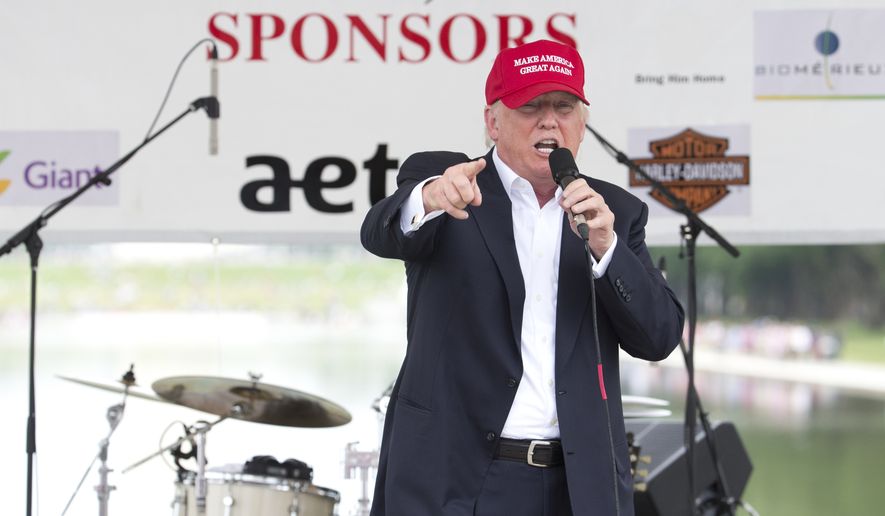There are signs that the “ostrich effect” is spreading inside the halls of Congress, where Senate Republicans running for re-election in tight races are putting distance between themselves and Donald Trump — with some wary of even mentioning his name.
While rank-and-file voters are lining up behind Mr. Trump, some conservative pundits, party leaders and members of Congress just aren’t there, saying they can’t square the billionaire businessman’s controversial rhetoric and personal attacks on the campaign trail.
Some senators in tight re-election races don’t stop for Trump-related questions.
“I haven’t really commented on Trump yet,” said Sen. Mark Kirk, whose Illinois seat is deemed one of the toughest for Republicans to hold this year, before zipping into a train.
Another of the vulnerables, Sen. Ron Johnson of Wisconsin, said he “hopes we find areas of agreement” — then retreated into a waiting elevator.
Mr. Johnson is among the GOP senators who shy away from endorsing Mr. Trump and instead say they support the Republican presidential nominee — signaling that they are doing so more out of duty to the party than an affinity for its next standard-bearer.
“To me, support versus endorse are two totally different things,” Mr. Johnson said in a recent radio interview.
Charles Franklin, professor of political science at Marquette University, said the Republicans being challenged in swing states are playing it safe when it comes to Mr. Trump.
“Senators are uncertain whether Trump will be an asset or a liability in the fall, and whether the party will rally behind him or not, and with that uncertainty it behooves them not to take a clear position supporting or opposing Trump,” Mr. Franklin said. “They can always embrace him a little bit later if that is where the party moves.”
The reluctance to back Mr. Trump stands in stark contrast with 2012, when at this point Mr. Kirk, Mr. Johnson, Sen. Kelly Ayotte of New Hampshire, Sen. Rob Portman of Ohio and Sen. Patrick J. Toomey of Pennsylvania had endorsed Mitt Romney, touting the former governor’s name as a badge of honor and saying they were proud to stand with him.
This time around Ms. Ayotte, who served as a top Romney surrogate, suggested that she doesn’t plan to go to the mat for Mr. Trump in her home state of New Hampshire.
“I’ve said all along that I’ll support the Republican nominee for president,” Ms. Ayotte recently told WMUR. “What that essentially means is that I will vote for our Republican nominee, but I don’t plan on endorsing in this election.”
Democrats mercilessly mocked that response, saying the Republican nominee is Mr. Trump, so supporting the slot means supporting the man.
“Not only do Republican senators and Senate candidates support Donald Trump, but they share many of his damaging policy positions,” said Lauren Passalacqua, spokesperson for the Democratic Senatorial Campaign Committee. “As Republicans attempt some tricky gymnastics to separate from Trump while also supporting him, the DSCC will continue holding them accountable for their dangerous shared agendas that are harmful for hard-working middle-class families.”
Still, GOP strategists, who just a month ago were fearing massive congressional losses with Mr. Trump at the top of their ticket, are somewhat mollified by recent state polling showing him running competitively with Democratic front-runner Hillary Clinton in swing states.
He’s even doing better in polling in Ohio and Pennsylvania than Mr. Romney was at this point, potentially making him an asset for Mr. Portman and Mr. Toomey.
Mr. Trump has also signed off on a joint fundraising outfit with the Republican National Committee, which will let him help raise money for the party’s efforts down the ticket. He also has won the support of some of his primary rivals, including former Texas Gov. Rick Perry and former Sen. Rick Santorum of Pennsylvania.
• Seth McLaughlin can be reached at smclaughlin@washingtontimes.com.




Please read our comment policy before commenting.